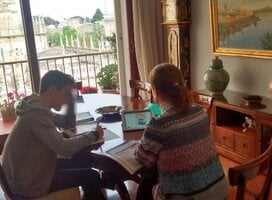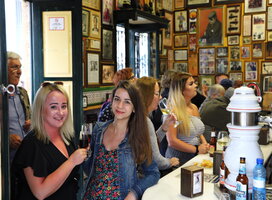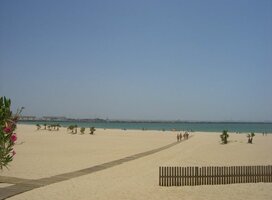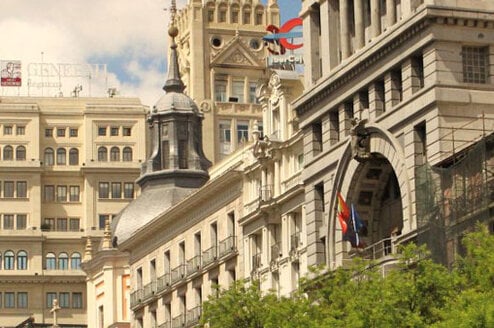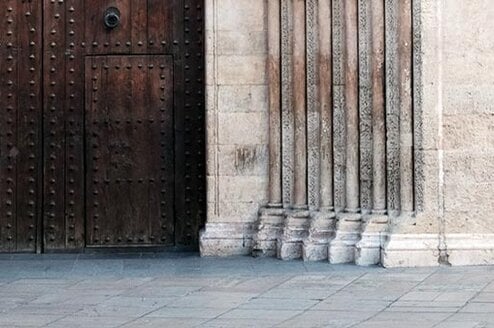Study Abroad Programs in Cadiz
Cádiz is considered to be the oldest city in Spain and in all of Western Europe. The city of Cádiz is part of the Andalusia region in Spain which is located in the South on the Atlantic coast.
Cádiz has become a popular vacation destination because of the stunning beaches with clean sparkling water; unlike other popular destinations in Spain there are worrying about overcrowding, making it perfect for your studies!
Due to its location in Europe, the weather is comparable to that of Southern California. Summers are very hot with temperature’s going up to 93ºF (34ºC) and winter temperatures are quite moderate with some raining but absolutely no fear of snow. The population of Cádiz is relatively small when compared to the metropolitan cities in Spain with a population of 402,256 with much of the population concentrated in the metropolitan area in Cádiz. Those wanting to study in Cádiz will experience a more intimate connection to both Spaniards and Spanish history due to the size of the port city.
There is only one major university in the city of Cádiz making this a destination that is more popular among European students than American students. The University of Cádiz will provide students with an intimate university setting in which you will get to know many of your classmates and professors.
Cádiz is ideal for those who want a more relaxed and slow paced lifestyle. One can enjoy taking a nice walk across the harbor or relax on the beach when coming to Cádiz, and because of its proximity to Africa, one could easily take a trip down to Morocco to experience a whole different culture.
Does studying abroad sound fabulous but expensive? While it is true, studying abroad can mean added costs, there are still a variety of ways to offset the extra expenses. If you're not up for opening a lemonade stand, I suggest checking out the following scholarships.
- API offers a variety of scholarships for those participating in their programs - including a few great options in Spain!
- CC-CS scholarship fund offers multiple scholarships, celebrating diversity or rewarding academic excellence for alumni and program participants.
- ISA sponsors the Dr. Carlos Castañeda Memorial Scholarships for students participating in an ISA program in a Spanish-speaking country.
- More Study Abroad Grants and Scholarships
Cádiz is definitely a city that takes a lot of pride in its ancient history. One can find many palaces and ancient buildings from the Baluarte de la Candelaria palace which was built in 1672 to the Teatro Romano which is thought to have been built during the time of Julius Caesar. Another interesting area for tourists and study abroad students alike are the old quarters which are full of buildings that will sure to satisfy any architecture lover. A city known for its rich history is sure enough to have some amazing museums and Cádiz offers a variety of museums. For those wanting to learn more about the city’s local history, the Municipal Museum covers all of Cádiz’s history.
Plaza de Mina is popular square located in the heart of the old Cádiz and is considered to be the most beautiful plaza in the city. The plaza is home to two museums, a cathedral, and buildings with neo-classical architecture. The two museums in the plaza are the Archeological Museum and the Real Academia de Bellas Artes which is sure to please those who are interested in art. The best thing about exploring the city is that there are a lot of student discounts offered. While some museums like the Real Academiz de Bellas Artes is free for European Union citizens, others like the Museo y Archivos Catedralicios have a student discount. Students that go to study at the Universidad de Cádiz (UCA) can use their tarjeta universitaria (school I.D. card) to get discounts in movie theaters, travel agencies, restaurants, hotels, and even at certain stores. The university I.D. card is basically a student’s best friend during their time in Cádiz. UCA offers a full list of all the places in the city where students can get discounts with their I.D. card.
The University of Cádiz participates in the ERASMUS program and has partner universities in Germany. Due to the low number of American students in Cádiz, spending a year, semester, or summer in Cádiz will provide students with the chance to meet Spanish and other European students. It will also guarantee a chance for students to get to immerse themselves into the Spanish lifestyle and get the opportunity to practice their Spanish.
Affordability
Study abroad programs in Cádiz run an average of $10,000 a semester and about $18,000 for an academic year. As always when comparing prices, make sure you take into account what is included in the study abroad fee. Some program fee will take care of housing fees while other programs have the students placed in temporary housing while they look for a place on their own.
The API program in Cádiz is one of the most affordable and well-rounded study abroad programs. The study abroad fee covers housing (whether it is living with a host family or in a student residency), advising, a free phone that students can use during the duration of their stay, and tuition (10-18 credits per semester).
API awards approximately $400,000 in scholarships a year, with some ranging from $250-$1,000 per student. Scholarships can also be found at Go Overseas or at your home university’s study abroad center.
Culture Shock and Support
As previously mentioned, advising is one of the things that is included in the API study abroad fee. Students have resident directors which are available to them at all times during their stay in Cádiz. The resident directors are locals from the host country which will provide the students with understanding of the local culture and explain some of the important cultural differences.
The Universidad de Cádiz also does its best to accommodate and help international students by offering a lot of programs from sports to cultural activities to help facilitate the process of meeting other people in a foreign city. Another great resource for support is the internet. By doing a simple web search one will be able to find blogs written by students that are studying abroad in the city or did so in the past. Couch Surfing has also proved to become a great resource for students wanting to meet other students in
the area.
When moving to Spain one can be expected to face some culture shock. First of all adapting to a Spanish schedule can prove to be a hard transition for those that are used to a high paced schedule. The Spanish like many European cultures, take life slow in order to enjoy it to the fullest. Most people might be shocked when they find out that most Spanish restaurants and businesses close at noon for two or three hours at a time during their infamous “siesta” time. Also Spaniards are known to take long lunches where they usually like to enjoy a glass of vino or a bottle of cerveza. Spanish dinner time might also take some time to get used to since dinner is usually served at 9pm at the earliest.
When it comes to the Spanish people one really has nothing to worry about. Spanish culture is very hospitable and warm. Even if your Spanish might not be the best, people in Cádiz will appreciate the effort. Other than the different language, food, and lifestyle settling into the Spanish lifestyle won’t be too hard if you keep an open mind. Spain is part of Western Europe which is of course very modernized and American culture can be easily found. Having American culture present in a day to day basis, whether its on TV, on the radio, or at the movies, will help relieve any culture shock.
Remember go to Spain with an open mind, having that mindset will prepare you for an easier transition into your new life.
Insider Tips
Instead of buying a guidebook rely things such as websites like Yelp and Foursquare to find where the locals like to eat, go out, or hang out. People upload their tips and reviews on both sites which will provide for a much better advice than guidebooks written for tourists.
When studying in Cádiz consider buying the monthly transportation card in order to ride the public buses. The pass is 22 € a month but it will prove to be a cheaper option than buying individual tickets or the 10-ride pass. The best way to learn about the bus lines is to dedicate a full day to learn the system. Try to get to places by yourself until you have a better understanding about the lines and how to move around the city using the buses.
A great way to learn about a culture is by imitating what the locals do. If you see a big crowd of people at a certain tapas place or bar then that might indicate that it is a good place. Be highly observant of the locals since they’re the ones that truly know best, and when in doubt ask for advice. It never hurts to ask random people or employees at certain business for recommendations.
Study Abroad Programs in Cadiz
What People Are Saying
Related Study Abroad Articles
Frequently Asked Questions
-
Is it safe to live in Spain?
Spain is a very safe country. But, just like the rest of Europe, Spain is notorious for pickpockets. It's important to not carry your passport around and always keep an eye on your phone!
-
How long does it take to get a Spain student visa?
Processing your visa application takes the consulate about 4 weeks. The most lengthy part of the process is collecting all of the documents and securing an appointment. For some consulates it is very difficult to secure an appointment, so it is best to plan ahead.
The documents needed to apply for a student visa are:
- National visa application form + photocopy
- Original passport + photocopy
- One recent passport sized photo (to be attached to the form)
- Copy of the acceptance letter from the Spanish University (in Spanish or with Spanish translation)
- Evidence of funds (could be a statement from the University describing housing or a notarized letter from your parents assuming financial responsibility)
- Proof of health insurance
- Medical certificate (only need for stays longer than 180 days)
- Express mail envelope with pre-paid stamps addressed to yourself with which the consulate may return your passport with the visa
Related Content -
Can I work in Spain with a student visa?
On a student visa, you can work up to 20 hours in Spain with a work authorization requested by the company you'd like to work for. The company will have to request this authorization from the Oficina de Extranjería (Foreigner's Office). It can take from 3 weeks to 3 months to process your application depending on the province, so it's best to apply as early as possible!
Related Content





